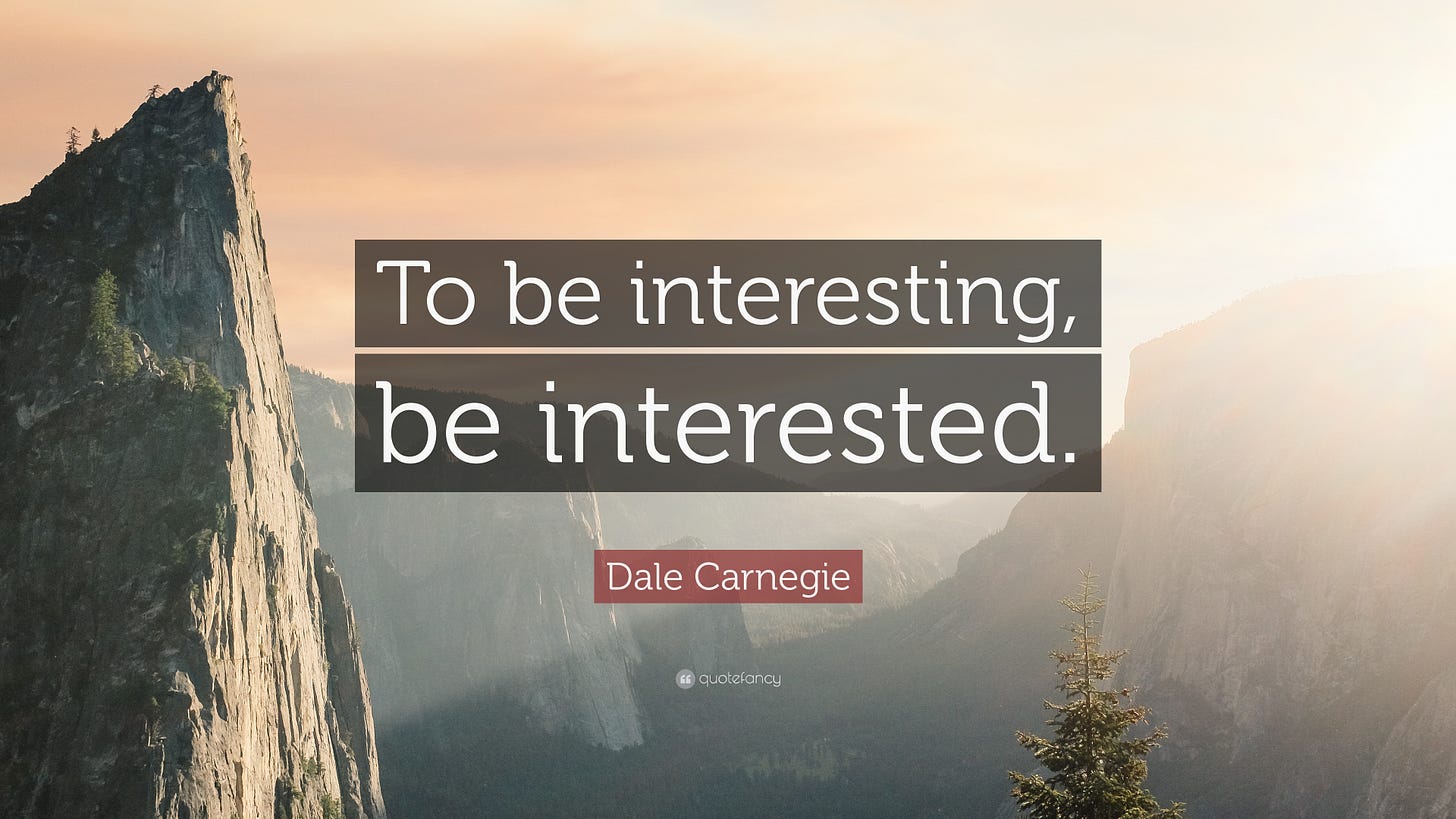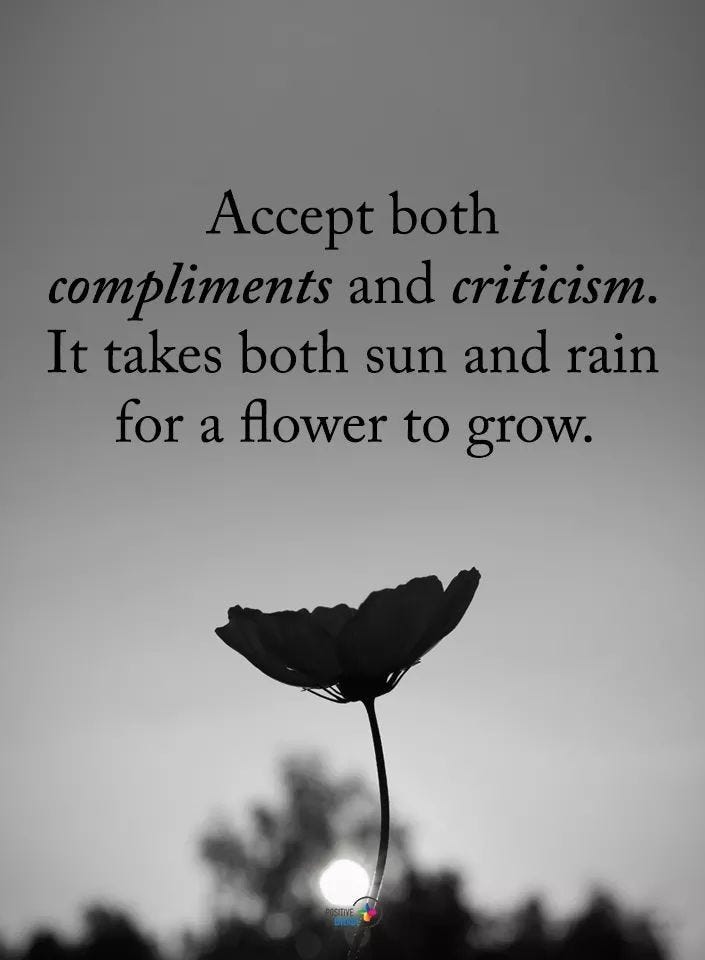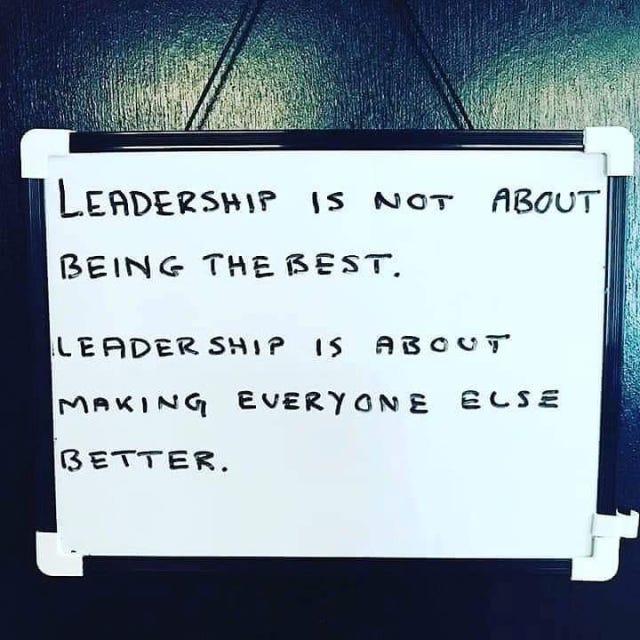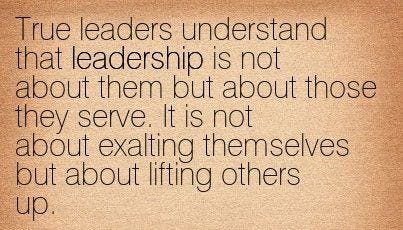How can I become who I want to be in six months? I'm 22, an introvert, poor communicator, and want to be an entrepreneur.
One of the most thorough answers I've ever written on personal growth for someone who asked on Quora.
This is part 3 of 4 of a series called, “You Can.”
In case you missed it, here’s part 1 and 2.
I know we're all looking for that magic pill that can get you there in 6 months or less, but I don't know if it exists. Hopefully my experience can point you in the right direction.
Buckle up, this is a longer read -- I address each of your points.
1.) "I am shy, introverted & I don't make friends easily. I'd like to be more extrovert, more friendly, able to talk easily to anyone without fear or hesitation, be interesting."
How do you be interesting?
Be interested.
Become curious.
You want people to like your company? You want to learn to easily talk to anyone? This is the key.
It's counter-intuitive but being a good conversationalist is more about your ability to ask questions than your ability to speak endlessly.
As I type this, I'm 3 days into my trip in Washington, DC and I've been meeting people nonstop:
The lady who sat next to me on the plane was on her way to her friend's niece's graduation. She used to take week-long road trips in her RV with her late husband and still goes by herself on occasion. She is retired, but she now fills her time with church activities, chores, hanging out with friends, shopping, seeing family, and seeing her great-grandchildren. She has 3 daughters and has an Irish heritage.
The guy who picked me up from the airport is in politics. According to him, yes, although many of the stereotypes of politicians are true, there are many people who get into politics with great intentions and are trying to change things for the better. Minimum wage for staff assistants in 1960 was $30,000, and apparently in 2015, it is still $30,000. The culture and environment in DC seems to be just as intense as Silicon Valley, but instead of tech, it's politics.
Last night, I had a long conversation with a man in a Senior Sales Management position for a large retail chain. He started learning sales at MayTag when he was 15 years old and was mentored by a star coworker who taught him everything about sales. He's a great salesman but a terrible customer, if you sell to him poorly, he won't hesitate to tell you to "f*ck off" and get someone else. He completely revamped his organizations' sales training when he was in his 20's and created his own training material for this very well-known brand. He despises the "shove it down your throat" style of selling and believes you never really "sell" something, you just help someone buy. He believes in truly understanding his customer's needs before pointing them into the right direction.
This morning, I met with a lady who helps manages finances for wealthy families. Her father operated Nuclear Submarines for the Navy, left to become a pastor, later became a Nuclear Power Plant consultant, and is now a professor at Oxford. Because of her dad's background, she had traveled the world as a child and would love to live in London one day. She has two sisters, both of them more than a decade older than her, but they are very close. She knew exactly who she wanted to be when she was 12 years old, but realized at the age of 21, she had many misconceptions about her dream career. And even now, she is tired of her finance career and is looking to find work in Corporate Philanthropy because she wants to do something more front-facing and meaningful.
I don't have any fear or hesitation with talking to people because I'm never trying to talk to people, I try to get to know them and their story.
I'm not trying to get them to see me as interesting, I'm making the assumption that THEY are the interesting ones and I'm the one trying to understand their world.
And because I'm trying to get to know them, I ask many questions.
Because I ask many questions, they end up doing 80+% of the talking.
Apparently, that makes me an introvert with social skills.
Goal: Learn to celebrate the differences and uniqueness of everyone's journey, you can always glean one valuable insight or useful reminder regardless of who you talk to. This is the primer for becoming curious.
Helpful Tactic: I've done some unconventional things; I've had an interesting journey and there are so many things about me that no one knows. The reality is, I am an iceberg. You are an iceberg. People are icebergs. There is a LOT more than meets the eye with anyone you meet.
Often, I end up asking the kind of questions I wish someone would ask me in order to uncover stories that lie deep within my life's iceberg.
P.S. Regarding your other point, making friends is a little bit different, but it's much easier when you understand the two fundamentals in learning to make friends.
2.) "I am a weak communicator, I don't feel at ease when giving public speeches or talking to a large group of people. I have taken communication classes but I am still not good at it."
Baby steps.
A major part of the shock in speaking in front of audiences is the "all eyes on you" aspect.
When I was in school, I used to be the guy that would dread every moment leading up to speaking in front of the class. I'd get cold sweats because I was so nervous.
But in the past 4 years, I've spoken at multiple conferences with 200+ people, and have been featured on 3 podcasts. It's quite a leap when I sum it up like that, but in reality, it was a long, incremental 7 year journey.
My first step was learning to share my opinion one-on-one with close friends. I used to think that my opinion didn't matter and that I was better off shutting up and keeping to myself. Realizing that my opinions were an expression of my individuality helped me have a healthier perspective of the value of my opinion.
My second step in learning to be comfortable in front of an audience was learning to talk in front of a group of 2-3. I learned this by mentoring a couple guys a year younger than I in high school for about a year (my idea of "mentoring" at the time was just sharing about what I was learning. It wasn't anything formal, I never saw myself as "leadership potential"). These interactions helped me realize that my opinions could actually have an effect on others.
I moved on up to groups of 4-5 by taking a handful of students from my old high school to lunch on a regular basis during my first year in college. I did this for about a year as well. These interactions reinforced my belief that my opinions could actually benefit others.
At this point, I was quite convinced that my opinions had the potential to help other people, so that in of itself encouraged me to continue to be more vocal about my learnings and discoveries.
After I dropped out of college and starting working with non-profits, the trend continued. I shared about my mission, my values, my direction, and the things I was working on along with a couple friends and began to build a following locally and on Facebook.
My friends and I started getting invited to speak in front of small groups of 10-20 (our idea of "speaking" or "teaching" was similar to my old 'mentoring' philosophy, we approached it as an opportunity to share stuff we had learned or had worked for us, and sharing some struggles on the way).
We built more traction and soon we had audiences of 30-40.
And then after 50+, it became a blur and I hardly noticed the transition. Once I got comfortable with one stage, taking the next step wasn't too scary, intimidating, or far-reaching.
And the more I spoke (and the more I wrote), the more I refined my abilities and became more eloquent. Despite all this, I never really thought myself as a teacher/speaker because they were intimidating titles to me at the time. Soon enough, I found myself standing in front of audiences of a couple hundred and was interviewed for a few podcasts.
It didn't really register that I had come so far until I found myself volunteering to co-MC my friend's wedding a couple years ago -- I would have laughed if you told me that was in my future as a teenager.
Baby steps!
Goal: Start sharing a couple things you've been learning with some close friends. Don't think of it as "teaching" or "speaking," just try to articulate things so that the other person can understand the idea you are trying to convey. When you get comfortable, try sharing it with less familiar people or with a larger group. Scale from there.
Helpful tactic: Talk about things you have expertise in. If you're trying to talk about something you barely know about, it's no wonder why you're nervous. I'd be nervous today if I had to do a presentation on Tech in Silicon Valley because I'm not in tech, but if it was Real Estate in Silicon Valley, that'd be a whole lot easier. Stick with what you know.
3.) "I am a stressful person, emotionally weak. I get flustered when I am on pressure and I have trouble dealing with criticism, emotionally."
Sometimes people can't handle criticism because they believe the criticism is a reflection of their identity as opposed to just a temporary screenshot of their journey in mastery.
Here are a couple shoot-yourself-in-the-foot-ways to deal with criticism:
"I'm such a failure/idiot"
"I'll never be able to do things right"
*Shrivel up in shame, introspect into disappointment*
Here's how to come out on top when facing criticism:
"Dang it, well, we're all learning and growing anyway"
"Ah, I missed that, I'll make note of it so I can correct it next time"
*Own it, open up, ask for constructive feedback, ask for help to improve and overcome the deficiency*
Being able to face criticism and own up to mistakes requires you to eat your humble pie. If trying to "save face" is more important to you than honing and developing your skills, I'm afraid I have some bad news for you... your pride will stop you from going very far.
So long as you believe that criticism is an attack on your sense of worth, you will always take it poorly.
But if you set your eyes on constant improvement, you will learn to value and even seek out criticism.
Goal: Lose the need to be perfect. Lose the need to look like you've figured it out. Look for constructive criticism, learn to enjoy the process of mastery.
Helpful Tactic: There is no shortcut here. Learn to value constant improvement over protecting your image and you will grow faster than ever.
Ditch the pride, be like a child. A child doesn't feel like it's the end of the world when they get 1+1 wrong, they just bounce back up and try to understand where it went wrong -- there's reason why kids learn so quickly, they're not scared to make mistakes and are glad to implement feedback in order to improve.
4.) "I am not much of a leader. I have taken the leadership of two club projects, being managing around 10-15 people each time. I have appreciated this. Having people under me stimulates me, makes me feel big and powerful, even though it was stressful at the beginning. But, from the feedback I have received, I am not good at being a leader (& the explanation is certainly in the 3 previous points)."
Leadership is not about a position, it is about influence.
When I was in 8th grade, I decided to try out for my school's volleyball team. I had played all kinds of sports by that point, so I picked it up quickly, passed tryouts, and made the team.
During one of our season matches, I had an off day and I started to miss all my serves. I grew nervous and I began to expect Coach to pull me out for the next set. To my surprise, she kept me in.
During the next set, I continued to miss most of my serves, so I was sure she was going to "sub" me out any second. She never did.
By the time the set ended, I was confused. I went straight to Coach and asked, "Why didn't you sub me out? I'm missing all my serves..."
"You keep the team together. Everyone talks more and works better together when you're there."
That blew my 13-year-old mind.
Leadership isn't about you being the best or using your position to control others. It's about how your presence amplifies the effectiveness of those around you in pursuit of a common goal.
Sometimes that means you pick up a fallen comrade, sometimes that means you create a safe environment for people to submit honest feedback, and sometimes that means you taking the back seat to someone who can do things better.
Sometimes you are encouraging, sometimes you are providing constructive criticism, and sometimes you are mediating a dispute. Sometimes you are giving public recognition of a member's contribution, and sometimes you are taking the time to understand their challenges and needs.
There are many facets to being a leader, but the way I see it, the need to be "big and powerful" doesn't mix well with being an effective, respected leader. A leader is there to serve the group, not to dominate it.
Perhaps start with these books:
How to Win Friends and Influence People (free online copy)
The 21 Irrefutable Laws of Leadership: Follow Them and People Will Follow You
5.) "I am new to data analysis. I think this field has a large potential & should interest me as an entrepreneur or even as a data analyst in the corporate world, but I have no real experience in the field... I need more experience, concrete and real training in these fields before thinking of starting my business. But, I can't figure out how."
The fastest way to learn is to learn by doing.
I began my career in real estate about about 2.5 years ago. When I started, I knew nothing about real estate, sales, marketing, negotiation, investing, and business building.
I set off with my business partner for 6 months and we made countless mistakes and fumbled around but somehow landed our first deal. That deal collapsed, but I ended up meeting my mentor because of it and it's been 2 years since he took me under his wing.
You can't steer a ship that isn't moving.
During those first 6 months, I didn't know up from down, left from right. I made unnecessary detours, sometimes went the wrong way, and wasted a lot of time. But the fact that I was moving caught my mentor's attention.
With his help, I course-corrected, made fewer mistakes and have probably shaved at least 10 years off of my learning curve -- that made 6 months of face-plants, toe-stubs, bumps, and bruises completely worth it.
Talking about wanting experience isn't enough, you have to do something. Talking about wanting training won't persuade someone to all of a sudden come and mentor you. But if you start moving, you will probably get both, whether it's from the School of Hard Knocks, or from a mentor figure that sees you in the distance.
Here's the secret treasure map that can show you how to get started.
Like I said, this isn't a magic pill that will get you there in 6 months. It may take a while for you to digest everything I've shared here (and reading all the links), but if you're serious about growing, it will be worth it.
It took me 7+ years to be able to address some of the challenges on your list, just keep at it and get better and better.
Be patient with yourself.
Just keep taking one step at a time.
Asking this question was a great start.
Keep asking, keep learning.
Stay hungry, stay humble.
This answer was originally published on Quora and had over 69,800 views.
I have 500+ answers on Quora and will be curating, IMO, the best answers I’ve written here for your convenience. All my Quora reposts will have this section for transparency and context, original content will not have this section.
After 10+ years of blogging all over the internets, I’m currently working on a book! If you resonate with my writing, you can sign up to get my book updates here.
When’s the next post coming out? I publish weekly on Sundays at 12pm Pacific (3pm Eastern, 3am Singapore, 8pm UK)









